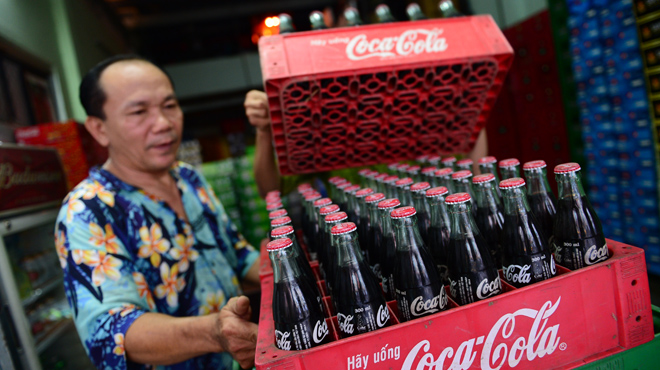After meeting with the Ministry of Planning and Investment and the Ministry of Industry and Trade of Vietnam on June 6th, Irial Finan, Coca-Cola Co’s Executive Vice President, and Clyde C. Tuggle, Senior Vice President cum Chief Public Affairs and Communications Officer, held an interview with the press about transfer pricing, which the firm is believed to have used for many years.
According to Mr. Tuggle, he is here to find a way for Coke to become a socially responsible enterprise in Vietnam.
“We have done business for 127 years in over 200 markets. Like other companies, our purpose is to make profit, which we have done successfully in other markets, but not in Vietnam. The reason is that what we are doing here is building our infrastructure and brand name and working to gain the love of Vietnamese customers, all of which are basic steps and need years to be completed in a new market”, he added.
Why is Coca-Cola Vietnam still investing US$300 million in spite of annual losses?
Mr. Tuggle said, “In terms of finance, we affirm that we have never made any profits in Vietnam. However, with our current strategy, Coca-Cola Vietnam will soon escape from this situation and earn profits in the coming years. You may need only three to four years to make profits in some markets, while it could takes over 20 years in others. Even in Coca-Cola’s most profitable markets, it took 25 years to earn our first gains.
That is what we do to achieve great success over time. We believe that if we always do things right and build trust among communities, we will win.”
Moreover, Mr. Finan said, “We are still investing because we believe in the potential of the Vietnamese market, which is in the first period of soft drink manufacturing development. In addition, profits can only be reached after building a strong base via investments. We believe with a stronger foundation, Coca-Cola Vietnam will develop.”
When will Coca-Cola Vietnam become profitable? After the investment of US$300 million?
“Yes, and I know all of you also want that. Investing Actually, US$200 million would be ble to return profits. However, we need to strengthen our foundations, such as brand name and infrastructure, for sure. Therefore, Coca-Cola Vietnam will most likely begin to gain profits in a few years,” Mr. Finan answered.
Could you give a more exact time than ‘in a few years’?
“Everyone, including us, wants to know the exact time. However, as businessmen, we are trying to build the foundations first. Furthermore, our business depends on the country’s economy”, Mr. Finan explained.
“We always abide by the local laws of every country we are present in. This means we always report our business activities and pay all taxes in every country whenever we have profits”, he added.
What do you think about the suspicion that Coca-Cola Vietnam is engaged in transfer pricing in order to evade taxes?
Mr. Finan answered, “Actually we have paid lots of taxes in Vietnam. Generally, the four most common taxes are the corporate income tax, VAT, import tax and personal income tax. The corporate income tax is the only one we are unable to pay currently because we have not made profits yet. Surely, we will pay this tax whenever profits come.
Prestige and the brand name are the most important things and we certainly don’t want to damage them. Therefore, from the viewpoint of businessmen, why would we avoid paying taxes when we want to do long term business in Vietnam?”
During your meetings with Vietnamese authorities, did anyone ask you about this issue, and what did they ask?
“I don’t want to talk about the meetings. I don’t know why this issue has becomes a problem. We always obey the local laws, not only in other countries but also in Vietnam. Moreover, Vietnamese authorities were seriously interested in our strategy in Vietnam, and they also hope we will succeed”, Mr. Finan said.
Mr. Tuggle asserted, “I strongly affirm that Coca-Cola Vietnam didn’t use transfer pricing to evade taxes, and we’d better stop discussing this issue here. In the meetings, Vietnamese authorities advised us to improve our communication system. Perhaps, we didn’t make it strong enough to avoid this accusation.
The Coca-Cola brand name, which took us 127 years to build, is valued at up to US$80 billion, and is the most valuable brand name in the world. Why should we lose it in a second? We certainly know that everything will be ruined if we don’t observe the local laws.”
The G8 group believes that countries should charge taxes on the total revenue of multinational corporations. What do you think about this suggestion? Has Coca-Cola considered this issue?
Mr. Tuggle replied, “No. To collect taxes all over the world, we must have a global government and a global tax office. Therefore, this is just an idea on paper.
You did say that you are providing jobs for 2,000 Vietnamese. Would you please share their labor cost and wages?
“There are many positions. How can I tell an exact number for all of them? There are many ways to calculate salaries. Therefore, companies are separated into groups according to their salary level. Coca-Cola is always listed as a company that pays salaries that are above average,” Mr. Finan replied.
“The labor cost in developing countries is lower than in developed ones. As a result, the labor productivity in developing countries is also lower. Workers loading and unloading packages, for example, are less productive than the ones in other countries. However, every Coca-Cola factory is built to the same standards, wherever they are. Therefore, excess capacity sometimes also increases costs and causes losses”, he added.




















































